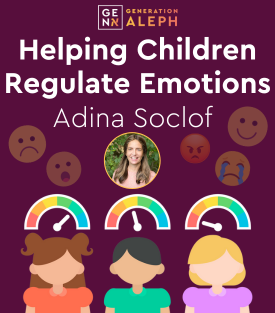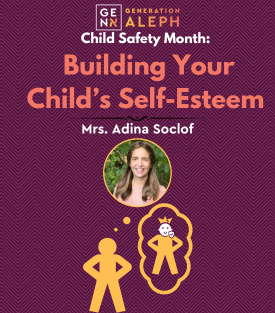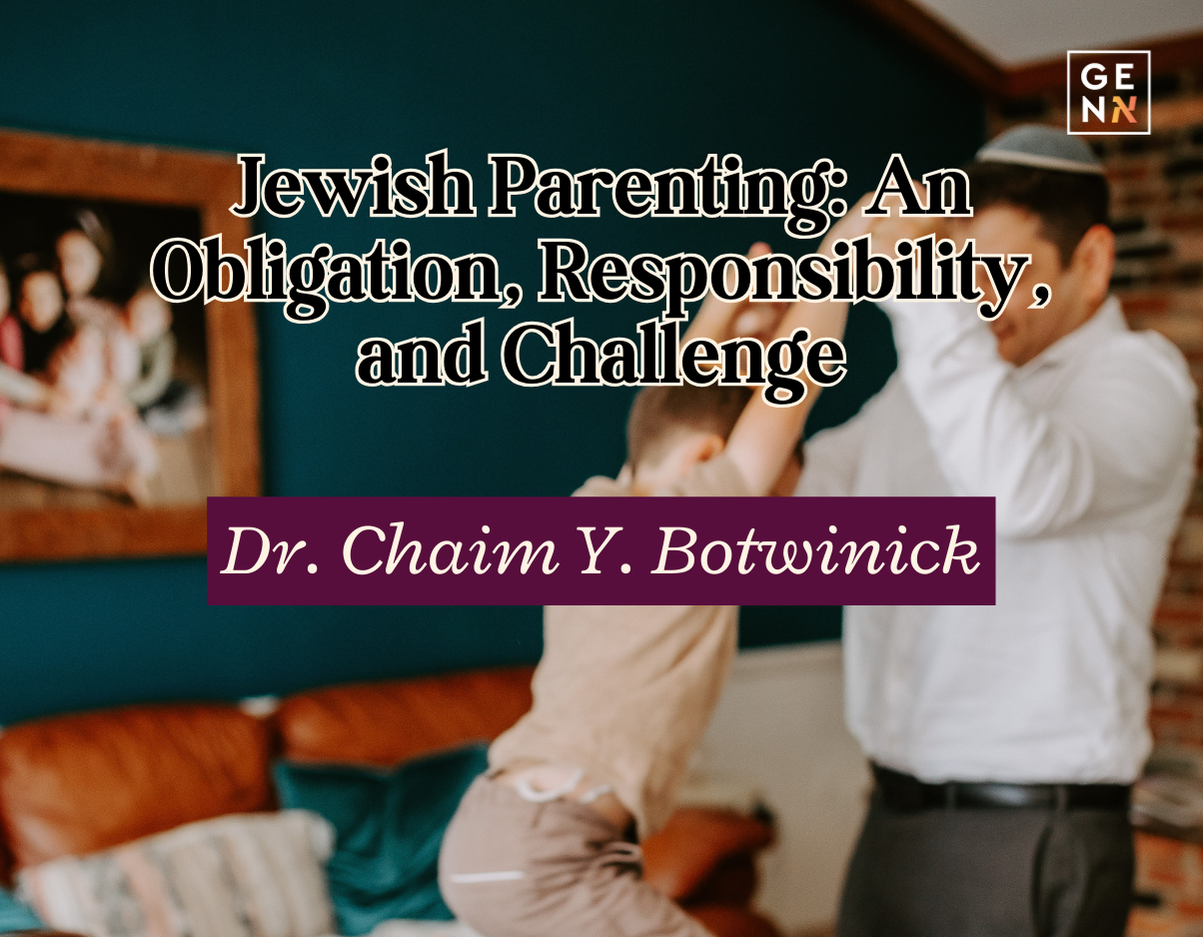As we know, the mitzvah (obligation) to procreate is found in the Torah, as it states Peru U’revu – “Be fruitful and multiply” (Genesis, 1:28).
This very first mitzvah in the Torah was addressed to both Adam and Chava, and then once again to Noah. It represents one of the most critically important mitzvot conveyed by GD to the Jewish nation. To be sure, it creates the foundation upon which many other commandments a based.
As we know, our Jewish identity understands and appreciates the very fact that every Jewish child who is brought into this world supports our Jewish future and continuity; and, represents the undeniable link in the important continuity chain of our Jewish history, legacy, identity and mesorah.
Throughout Jewish history, children have occupied a very special and privileged position in Judaism. As a child-centric community, we continuously focus upon the critically important role of children in Judaism as well as parental responsibility towards our children’s welfare and education.
One example to illustrate this point includes the importance and relevance of the Pesach Seder.
During Passover, we are obligated to repeat to our children the Exodus Story. In doing so, we help convey our Jewish identity and aspire to build a foundation of bitachon and emunah in Hashem. The essence of this mitzvah or obligation is found in the passage “tell your children on that day it is because of this that GD did for me when I left Egypt (Shemot, 13.9)
Both the Mishnah and Talmud explore the responsibilities of parents towards children (tractate Kiddushin (29a-32b). This tractate clearly describes and delineates the parent-child imperative as being both profoundly important, challenging and essential in Judaism.
Our success as parents in providing our children which guidance, direction and modeling are totally dependent upon HaShem.
To be sure, we can try to do all the “right things” in raising our children – whether they be Torah study, adherence to mitzvot, modeling, creating nurturing homes, discipline or loving guidance. Nevertheless, at the end of the day, HaKol B’Shamayim – all of our successes are bestowed and granted by the Heavens.
As Rabbi Noach Orlowek illustrates in his amazing book entitled “Raising Roses Among Thorns” suggests that although the “apple does not fall far from the tree” we as parents are nevertheless, continuously obligated, and responsible to raise our children in accordance with Jewish law. “Train children in the right (proper) way, and when old, they (the children) will not stray”, (Proverbs 22:6) is a verse which has tremendous value and significant implications.
As a Jewish people, we are never in full control of how our children will turn out as adults or as young adults, nor should we ever judge a parent or parents when we observe a child moving in a direction which can be detrimental or a bit off “the proper path”.
Remember, there is no perfect formula for child-rearing. At best, we try hard to give it our very best shot; and then, hope and pray to HaShem that our children will be blessed with bracha and hatzlacha in order to pursue a derech yashar (a straight path) imbued with Torah and mitzvoth.
Twenty- First Century Challenges:
As indicated in a wide variety of articles, papers, social media posts and podcasts, (many of which have been presented on the GenAleph website), raising children in today’s environment is beyond daunting and challenging. Today’s societal zeitgeist, norms and standards, makes child-rearing the single most challenging and difficult endeavors for young parents.
With the advent, proliferation and promotion of wokeism and its negative impact on the family and societal values, we are all struggling tremendously with this harmful movement against a backdrop of values and morals which are antithetic to Judaism. We must continue to strike the important balance between what we and our families are experiencing in society versus what our Torah values suggest and even demand. This includes our search for civility, moral development and moral clarity.
It is imperative that we protect our children (and ourselves) from these harmful influences by determining ways to enrich their lives with wholesome values and standards.
According to chazal and many meforshim (commentators), our personal behaviors and standards are but a mirror image of our societal and communal values. They are also interpreted as a reflection of our familial priorities, deeply rooted and anchored in our way of life.
So given the complex intertwined mosaic of societal norms and standards and their negative influence on our children, where do we begin? How do we protect our family and children from these influences? And…..What is our obligation in doing so?
Moving Forward:
First and foremost, parents must insure that their children are exposed to safe and healthy environments. These include the schools their children attend, the type of education they are receiving in these schools, the friendships our children enjoy, the type of social media to which they are exposed, the homes they visit and finally of course, the very homes in which they live.
Parenthetically, these physical challenges are at times (if lucky) offset by strong family ties and nurturing environments which continuously support and promote our Torah values and standards.
It is important to note that there are no compromises when it comes to child rearing, lest we relax our standards at great peril.
Children require and demand continued devoted care, love and respect….complimented by a value system which places the child front and center of a parent’s life.
On the one hand, the question may be asked, how in the world is it physically possible to protect our children from the variety of strong and powerful negative societal influences? On the other hand, as realists, we ask the question….. is it even possible in today’s world?
Short of living in a cave or keeping our children in a 24/7 protective cocoon, we all know that it is virtually impossible. We can only try to create the necessary strong and meaningful environments in which our children can flourished, grow and develop. In doing so we hope that they will be somewhat insulated and protected from external negative influences.
So how do we make this happen?
Several of my colleagues will argue that by keeping our children protected from these societal influences, we are in fact creating a generation of insecure, overly protected and super vulnerable youth. Then there are others (with whom I totally concur) who feel that our community cannot do enough to protect our children from the negative influences of our society. Remember, our children are only in our charge for a limited period of time. It is essential that we maximize this time effectively and wisely.
As indicate, there is no child-rearing magical formula. To be sure, there are many steps parents can take to protect their children’s wellbeing.
We learn in Chochmah Umussar (on Shemot) that care for our children through “empathy” must become a top priority for parents. The power of empathy, as illustrated in Moshe Rabeinu’s feelings towards others, is a clear example of the impact of empathy on our children.
The second challenge is “understanding”. This attribute require a deep and profound commitment to understanding what our children require, desire, yearn for and are attracted to.
The third gift which we can provide our children is “positivity”. This characteristic was described by the great Torah scholar and giant, the Chofetz Chaim. According to the Chofetz Chaim, positivity is an attribute, characteristic and middah, which permeates negativity and represents a disposition which should be emulated and modeled – especially as it relates to our children.
Ten Opportunities of Effective Child Rearing
In light of the myriad of challenges as just presented, the following ten opportunities are suggested for parents.
It is important to note that although these opportunities do not represent the end all or be all of effective Jewish parenting, they do suggest a variety of activities and commitments that are necessary in order to provide our children with safe, secure, protective and healthy environments.
It is essential that parents set aside quality time to spend with their children. This quality time must be devoted to their children irrespective of parental time constraints or competing needs;
Parents must always be open, frank and transparent with their children;
Parents should never shy-away from inquiring how their children spend their valuable time outside of the home;
If your child is invited to spend Shabbat at a friend’s home, it is imperative that the parent vet the home in which the child is visiting in order to ensure appropriate standards in that home for your child. Parents should even familiarize themselves with the families of the child’s friends even prior to permitting the child to visit for Shabbat;
Parents must keep a keen eye on how their children are progressing both academically and socially in school; this requires on going contact with teachers and the administration;
The use of technology in the home must be limited and monitored at all times. Children should never be permitted to use social media technology which is unsupervised by a parent;
Parents must always set aside time to listen very carefully to their children and to hear from their children about any concerns they may have – whether they be school, family or friendship related;
Parents should keep a very close and mindful eye on the books and reading material their children are reading and discussing;
It is important for parents to ask their children about their friends – who they are, how they behave and how they are being supervised;
Parents should never shy away from asking their child’s teacher (Kodesh and Chol) about their child’s behavior and middos both in and out of the classroom.
At first blush, these ten parental engagement opportunities suggest a level of stringency and close monitoring that may be viewed as suffocating, with strict oversight. They may also suggest a level of micromanagement which may not sit well with select parents or their children.
Irrespective of perception, we must always be mindful of the fact that as parents, we are only given “one kick at the can” in order to ensure that our children have the proper supervision, guidance and environments conducive to their healthy growth and development. To this end, we must take advantage of the fact that our children are still in our charge and that they are still a captive audience. This reality makes it even easier to provide them with guidance and a sense of direction.
Over the years, as past principal and head of school, I used to hear numerous parents painfully bemoan the fact that while their children were younger, they let opportunity slip by and never really took advantage of opportunities to “do a better job” parenting their children. Comments like, “if I only knew then what I know now” or “I wish I can turn back the clock” became a common reframe from parents who indeed let opportunity pass them by.
There are many lessons that are learned from these comments by parents
The first is that quality time with our children is invaluable and precious. Don’t squander it; use it wisely.
The second is that the more time, energy, effort and attention we accord to our children, the more it increases the likelihood that our children will benefit immeasurably from our involvement.
And finally, effective parenting is a challenging and difficult ongoing process and commitment. It does not come and go like an emotion; and it does not happen by itself; and it is definitely not a one-off moment in time.
So, the next time you interact with your child or children, ask yourself the important question – “am I doing enough to ensure my child’s emotional and physical welfare, safety and growth”. The answer is probably, yes but “not enough”.
B’hatzlach
Submit your questions
"*" indicates required fields










